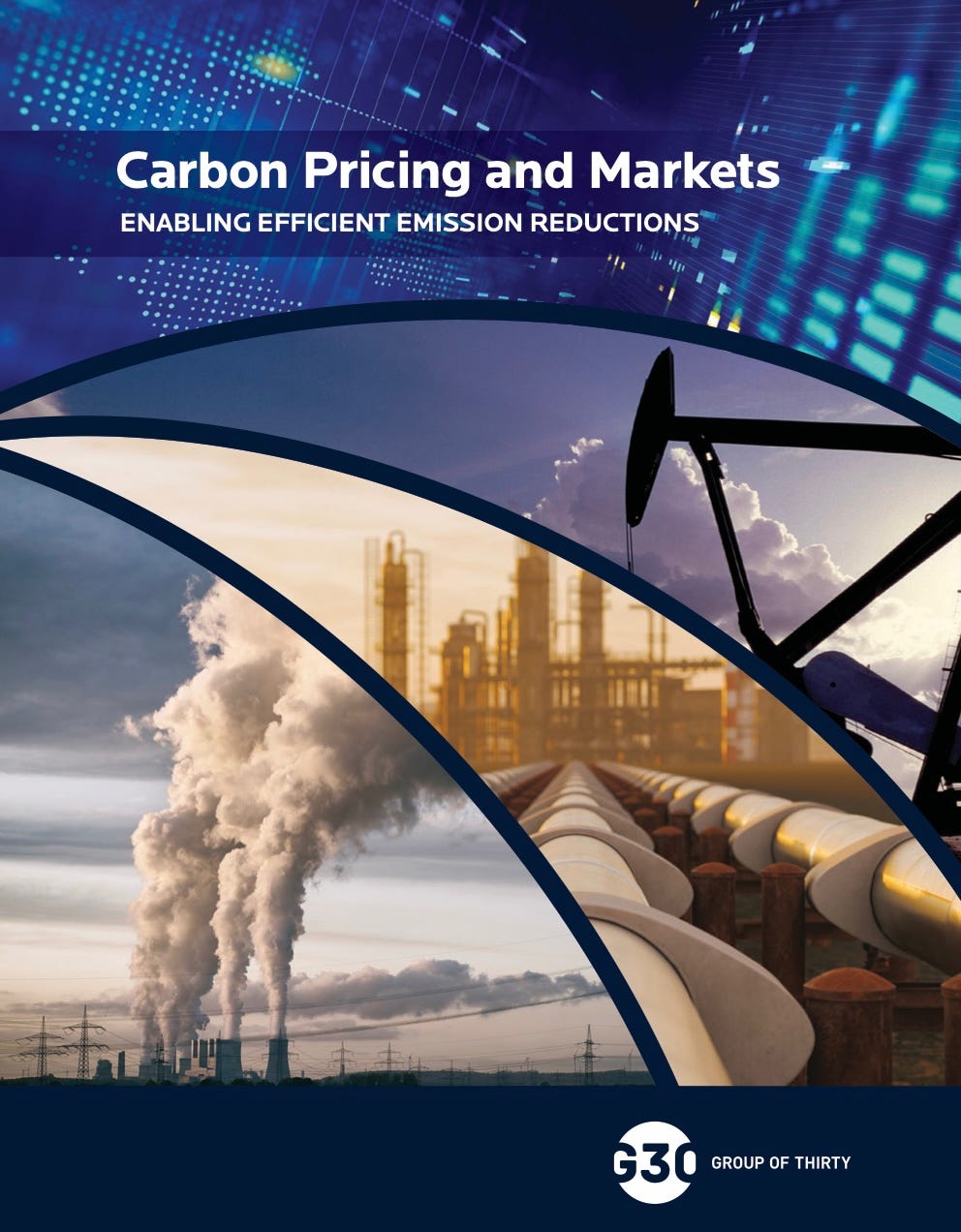🎙️ Episode Details
Guest: Adair Turner, Baron Turner of Ecchinswell
Title: Carbon Pricing and Markets: Managing Systemic Climate Risk
Host: Lyric Hughes Hale, Editor-in-Chief of econVue
Producer: Sam Fu
Recorded: Wed Oct 1, 2025 · 60 minutesIn Episode 73 of The Hale Report, Lord Adair Turner — economist, former head of the UK Financial Services Authority, and chair of the G30 Working Group on Carbon Pricing, discusses the group’s new report:
📑 Carbon Pricing and Markets—Enabling Efficient Emission Reductions 🔗
Whether you are an expert in the field, or just learning about carbon pricing, you will find this conversation to be both realistic and enlightening. Turner discusses why taxes on carbon emissions is at the center of climate and economic policy today. Turner has spent his career navigating systemic risks, from financial crises to the climate emergency, and here he explains why the two are more alike than they seem.
Turner’s reputation is built on tackling the hardest problems: stabilizing the UK financial system during the 2008 global crash, guiding Britain’s Climate Change Committee in its early years, and now shaping global thinking on how to design carbon markets that actually work. With a voice both pragmatic and urgent, he argues that carbon pricing is not a side policy, but the linchpin of any credible path to net zero.
Yet the world remains far from alignment, as the G30 Report reveals. Only about 28% of global emissions are priced today, and most at levels far too low to change behavior. Turner acknowledges the skepticism: carbon taxes can be politically toxic, carbon credits are vulnerable to greenwashing, and developing nations face steep trade-offs between growth and climate. Still, he insists that well-designed carbon pricing — with integrity, transparency, and fairness can prevent climate policy from repeating the same mistakes as finance: ignoring risks until they explode.
For Turner, the lesson of 2008 is clear: systemic problems can’t be left to markets alone. Just as unregulated financial innovation gave us subprime mortgages and a near-collapse of global banking, weakly policed carbon markets could create a bubble that bursts at the worst possible time. His warning is blunt: don’t confuse market activity with real solutions.
This episode isn’t just about economics — it’s about the political and moral choices that determine whether carbon pricing becomes a tool for progress, or another failed experiment.
💬 𝓁𝓎𝓇𝒾𝒸
🎙️ Host of the Hale Report®
📍Chicago
🎤 Key Moments
On choosing his life’s work
❝ My life has been about systemic risks — whether in finance or climate. Both demand foresight, honesty, and coordination.
On why carbon pricing matters now
❝ Only 6% of emissions are priced at effective levels. That gap is existential. Unless we scale, we won’t achieve deep decarbonization.
On carbon removal and credits
❝ By 2050, demand for carbon credits could reach 8 billion tonnes — but integrity is everything. Otherwise, it risks becoming indulgences for polluters.
On who pays for carbon taxes
❝ Companies may pay initially, but costs flow to households through higher bills. The political challenge is cushioning that impact…ultimately consumers pay.
On global equity
❝ Emerging economies now account for two-thirds of emissions. Rich countries must share revenues or the system will lack legitimacy.
On CBAM (EU Carbon Border Adjustment Mechanism)
❝ It’s both a climate tool and a trade weapon. It pressures others to price carbon — and reshapes industrial policy at the same time.
On parallels with the 2008 financial crisis
“Carbon markets risk becoming today’s subprime if they’re opaque and complex. The lesson is: don’t confuse innovation with value.
On the road ahead
“Carbon prices may need to exceed $500 a tonne by 2040. Whether through tech breakthroughs or political will, we must prepare.
🔑 Takeaway
Turner’s central message: carbon pricing is unavoidable, but it must be designed with fairness and integrity to drive real change. He stresses that the goal is not to let polluters “buy indulgences,” but to force a shift from old, carbon-intensive production to new, zero-carbon methods. The echoes of 2008 are clear: just as unregulated finance created a subprime bubble, weakly regulated carbon markets could implode. For Turner, the global challenge is balancing equity for developing nations, political acceptance at home, and the scale of transformation required.
🎙️ About Our Guest: Adair Turner
Economist, regulator, and climate leader
Chair, G30 Working Group on Carbon Pricing
Chair of the Energy Transitions Commission (ETC)
Former Chair, UK Financial Services Authority (during 2008 crisis)
Former Chair, UK Climate Change Committee
Author of Between Debt and the Devil (2015)
📚 Influences

Asked who he would most like to share a dinner with, Adair Turner chose John Maynard Keynes. Keynes, he explained, combined the rare ability to navigate theory, policy, and politics — and to communicate with wit and style. For Turner, a conversation with the architect of modern macroeconomics would be the ultimate exchange on how to balance markets, government, and human progress.
🎧 Thank you! Share now on Substack or your favorite podcast platform.














